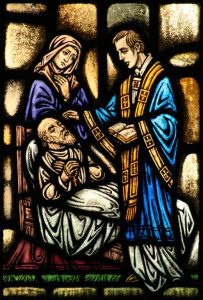“By the sacred anointing of the sick and the prayer of the priests the whole Church commends those who are ill to the suffering and glorified Lord, that he may raise them up and save them. And indeed she exhorts them to contribute to the good of the People of God by freely uniting themselves to the Passion and death of Christ.”
(Lumen Gentium, 11 as quoted in Catechism of the Catholic Church, 1499)
What is Anointing of the Sick?
 Anointing with sacred oil is a sign of blessing by the Holy Spirit of the one who is sick. Oil of the Sick, which receives a different blessing from the Chrism oil used during Baptism, Confirmation, and Holy Orders, recalls the community’s sharing of the Holy Spirit and the sick person’s connection to the entire Body of Christ and Communion of Saints.
Anointing with sacred oil is a sign of blessing by the Holy Spirit of the one who is sick. Oil of the Sick, which receives a different blessing from the Chrism oil used during Baptism, Confirmation, and Holy Orders, recalls the community’s sharing of the Holy Spirit and the sick person’s connection to the entire Body of Christ and Communion of Saints.
During the Sacrament, the priest or Bishop lays his hands on the head of the sick person; then proceeds to anoint, with the blessed Oil of the Sick, the forehead and hands. He accompanies these acts with the words: “Through the holy anointing the Lord in his Love and mercy help you with the grace of the Holy Spirit. May the Lord who frees you from sin save you and raise you up.”
For those who are about to depart from this life, the Church offers the person Penance, Anointing of the Sick, and the Eucharist as Viaticum (food for the journey) given at the end of life. These are “the sacraments that prepare us for our heavenly homeland.” These rites are highly valued by Catholics as powerful aids to a good death. Since Holy Communion is the effective sign of Christ’s Paschal Mystery, it becomes for the recipient the opportunity to unite one’s own suffering and dying to that of Christ with the hope of life eternal with him.
What Does the Anointing Do?
The Catechism also states that the special grace of the Sacrament of Anointing has as its effects:
- the uniting of the sick person to the passion of Christ, for their own good and that of the whole Church;
- giving the sick person the strength, peace, and courage to endure in a Christian manner the sufferings of illness or old age;
- providing for the restoration of health, if it is conducive to the salvation of the soul;
- helping the sick person in the preparation for passing over to eternal life.
Who Receives it?
According to the Catechism of the Catholic Church the proper time for receiving this holy anointing arrives when the believer begins to be in danger of death because of illness or old age. Each time a Christian falls seriously ill, they may receive the Anointing of the Sick, and also when, after they have received it, the illness worsens.
Many incorrectly view the Sacrament as being taboo because some believe it automatically brings death, but Pope Francis said it should be reassuring to know that in moments of pain or sickness we are not alone. The greatest comfort derives from the fact that it is the Lord Jesus Himself who is made present in the Sacrament, Pope Francis added. “He takes us by the hand and reminds us that we now belong to Him and that nothing – not even sickness or death – can ever separate us from Him.”
To receive the Anointing of the Sick contact your parish. To find a local parish click here.
Taken from “A Sacrament of Healing and Comfort” by Bob Reddy & Correspondent Nadia Smith, Florida Catholic






